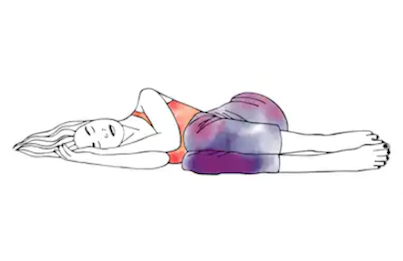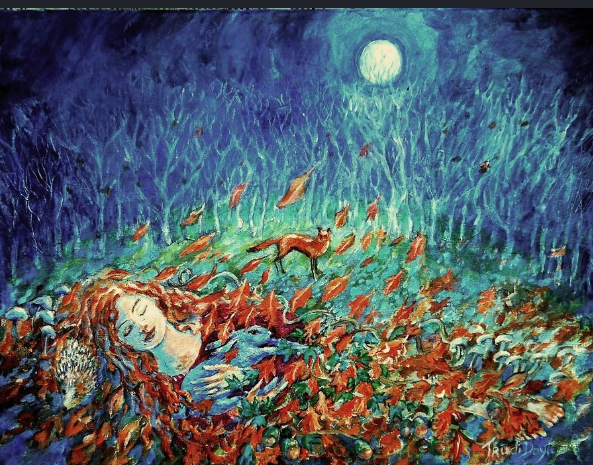“Each night, when I go to sleep, I die. And the next morning, when I wake up, I am reborn.”
― Mahatma Gandhi

Happy New Year! Happy New Decade! Early January and the holidays are over and most of us are getting back into ‘Real Life.’ For many of us, we’ve burned the candle at both ends and perhaps are feeling the exhaustion of the culmination of doing too much and not getting enough sleep. I’ve heard so many women in the last month or so tiredly grin, (or grimace) and say “No rest for the weary.” As though we all must blithely accept exhaustion.
But No – We cannot accept this lying down . . . or more likely running around! Sleep is essential and has been described by sleep expert Matthew Walker, as our life-support system and Mother Nature’s best effort yet at immortality.
The decimation of sleep throughout industrialized nations is having a catastrophic impact on our health, our wellness, even the safety and the education of our children. It’s a silent sleep loss epidemic, and it’s fast becoming one of the greatest public health challenges that we face in the 21st century.
So why do we need sleep? What difference does a good night’s sleep actually make? I think we all know the obvious answers to that – lack of sleep makes us tired, grumpy and not quite able to think properly. But research shows that it’s much more serious than that. Not enough sleep or poor quality sleep impacts our immune system, hormones, heart, learning, memory and even impacts men’s testicles and women’s reproductive organs. Interestingly enough, it also impacts our genetic code.
Lack of sleep hugely impacts our ability to heal as well. In our body we have cells that protect us, sometimes called natural killer cells. You can think of natural killer cells almost like the secret service agents of your immune system. They are very good at identifying dangerous, unwanted elements and eliminating them. In fact, what they’re doing here is destroying a cancerous tumor mass. So what you wish for is a virile set of these immune assassins at all times, and tragically, that’s what you don’t have if you’re not sleeping enough.
And as we age, and our memory seems to fade rapidly, all of us over 50 can certainly attest to that, sleep is even more essential. Research is showing that the disruption of deep sleep is an underappreciated factor that is contributing to cognitive decline or memory decline in aging, and most recently discovered in Alzheimer’s disease as well.
Basically in a nutshell there is nothing positive about not getting enough sleep.
A good laugh and a long sleep are the best cures for anything.
– Old Irish Proverb

On the other hand, getting enough sleep positively impacts us in almost every way. We have a stronger immune system, better focus, better memory, and a more optimistic outlook on life.
Walker describes recent research done at UC Berkeley on sleep and learning:
“By placing electrodes all over the head, what we’ve discovered is that there are big, powerful brainwaves that happen during the very deepest stages of sleep that have riding on top of them these spectacular bursts of electrical activity that we call sleep spindles. And it’s the combined quality of these deep-sleep brainwaves that acts like a file-transfer mechanism at night, shifting memories from a short-term vulnerable reservoir to a more permanent long-term storage site within the brain, and therefore protecting them, making them safe. And it is important that we understand that during sleep actually transacts these memory benefits, because there are real medical and societal implications.”
Sleep provides time for our brains to tidy up and make space; this action is called synaptic pruning.
“Sleep provides a time when the brain’s synapses — the connections among neurons—shrink back by nearly 20 percent. During this time, the synapses rest and prepare for the next day, when they will grow stronger while receiving new input to learn new things.”
Without this reset, known as “synaptic homeostasis,” synapses could become overloaded and burned out, unable to function at an optimal level. Scientists call this “use-dependent cortical reorganization,” meaning that we strengthen whichever neural pathways we use most often, and lose the ones we use the least.
I am totally in favor of pruning those unused pathways. I usually feel like my brain can use a little Marie Kondo action!
I think we all can agree that getting more and better quality sleep is essential. But what is the best way to do that? Fortunately, Walker does have a few suggestions:
The first is regularity. Go to bed at the same time, wake up at the same time, no matter whether it’s the weekday or the weekend. Regularity is king, and it will anchor your sleep and improve the quantity and the quality of that sleep. The second is keep it cool. Your body needs to drop its core temperature by about two to three degrees Fahrenheit to initiate sleep and then to stay asleep, and it’s the reason you will always find it easier to fall asleep in a room that’s too cold than too hot. So aim for a bedroom temperature of around 65 degrees, or about 18 degrees Celsius. That’s going to be optimal for the sleep of most people.
One of my New Year’s Resolutions this year is to meditate more often, and the Dalai Lama declares that sleep is the best meditation. And who am I to disagree with the Dalai Lama? So I think I’ll close here and go take a nap. Happy New Year to all of you, and may you have a restful 2020 filled with wonderful deep healing sleep.


